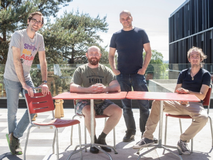Luya wins CHF 150,000 to advance its plant-based meat alternative
30.03.2022
Luya turns food waste into a plant-based meat alternative: The Zollikofen-based startup uses organic okara—a by-product of tofu and soy milk production—to manufacture ready-to-cook slices, chunks, and patties. By combining traditional fermentation methods and modern technology, Luya does not use any additives and highly processed ingredients to offer organic meat alternatives. The startup will use the CHF 150,000 to scale its production and further develop its solid-state fermentation technology.
 The Luya co-founders
|
The consumer demand for plant-based products is growing, but existing meat alternatives often use many artificial ingredients and require expensive, heavily refined protein isolates. At the same time, in Switzerland alone, more than 950,000 tons of readily available, valuable food side streams remain unused.
Luya’s products satisfy the growing need for nutritious meatless protein sources while reducing food waste. The global market for alternative protein is expected to reach USD 140 billion by 2029; more than 14 million tons of okara (soybean pulp), Luya’s main ingredient, go to waste globally every year. The foodtech startup provides an environmental-friendly solution with its intelligent manufacturing process: Compared to the production of the same amount of red meat, Luya can avoid up to 95% greenhouse gas emissions.
Luya’s novel and patent-protected production process uses a tempeh-like fermentation method and only two base ingredients—okara and chickpeas—to create textured, juicy and flavorful products that are minimally processed and have a healthy amount of protein, fiber, and micronutrients. The Swiss-made meat alternatives are also certified organic. Consumers can prepare the versatile products similarly to meat or meat alternatives.

The Luya co-founders (from left to right): Flavio Hagenbuch, Michael Whyte, Christoph Denkel, and Tobias Kistler
Luya was founded by Dr. Christoph Denkel, Flavio Hagenbuch, Tobias Kistler, and Michael Whyte. In the coming months, the startup will open its pilot plant to satisfy the growing demand and bring the products to more restaurants and retailers in Switzerland. The Luya team will use the Venture Kick funds to accelerate its production scale-up and further develop its solid-state fermentation technology. Creating more products and flavor variants will also help meet the growing interest in Luya.
“The Venture Kick program, with its clear focus on traction, helped us to create an ambitious plan with clear milestones for each stage of the Venture Kick program. We took this plan and gave our best to make it happen,” said Flavio Hagenbuch, Luya co-founder.
Luya’s products satisfy the growing need for nutritious meatless protein sources while reducing food waste. The global market for alternative protein is expected to reach USD 140 billion by 2029; more than 14 million tons of okara (soybean pulp), Luya’s main ingredient, go to waste globally every year. The foodtech startup provides an environmental-friendly solution with its intelligent manufacturing process: Compared to the production of the same amount of red meat, Luya can avoid up to 95% greenhouse gas emissions.
Luya’s novel and patent-protected production process uses a tempeh-like fermentation method and only two base ingredients—okara and chickpeas—to create textured, juicy and flavorful products that are minimally processed and have a healthy amount of protein, fiber, and micronutrients. The Swiss-made meat alternatives are also certified organic. Consumers can prepare the versatile products similarly to meat or meat alternatives.

The Luya co-founders (from left to right): Flavio Hagenbuch, Michael Whyte, Christoph Denkel, and Tobias Kistler
Luya was founded by Dr. Christoph Denkel, Flavio Hagenbuch, Tobias Kistler, and Michael Whyte. In the coming months, the startup will open its pilot plant to satisfy the growing demand and bring the products to more restaurants and retailers in Switzerland. The Luya team will use the Venture Kick funds to accelerate its production scale-up and further develop its solid-state fermentation technology. Creating more products and flavor variants will also help meet the growing interest in Luya.
“The Venture Kick program, with its clear focus on traction, helped us to create an ambitious plan with clear milestones for each stage of the Venture Kick program. We took this plan and gave our best to make it happen,” said Flavio Hagenbuch, Luya co-founder.


